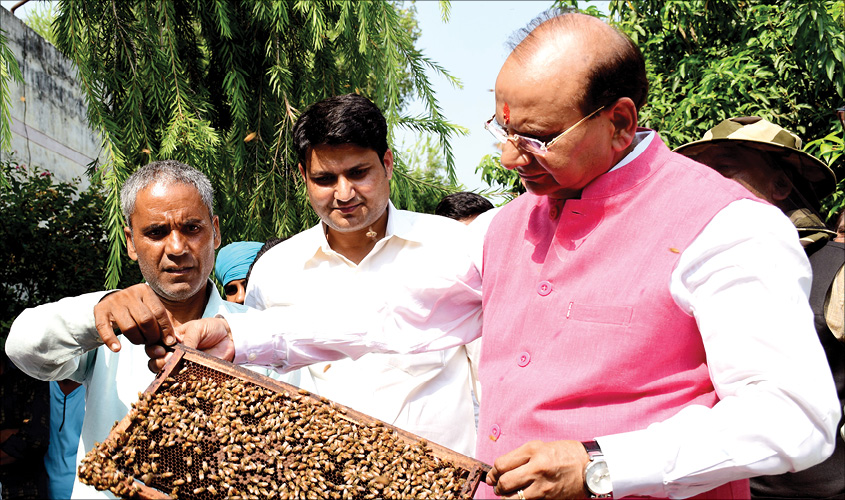Seeking to encourage and rope in farmers extensively in beekeeping and honey production, the Khadi and Village Industry Commission (KVIC) has launched “Apiary on Wheels”, an initiative aimed at reducing labour and maintenance costs to the farmers. “Apiary on Wheels”, launched by Union Minister of MSME Nitin Gadkari on 14 February this year, is a platform for safe and swift movement of bee boxes without disturbing the bee colonies.
KVIC chairman V.K. Saxena said the “Apiary on Wheels” initiative is equipped with the technique of sugar drip to feed bees and cooling with the help of solar panels causing zero risk to the lives of bees. “This essentially prevents any damages to the bee boxes or bee colonies and help produce quality honey,” he said. As a pilot project the “Apiary on Wheels” initiative will be placed near the mustard farms near the Delhi border under the supervision of local bee keepers and KVIC and after successful implementation, the concept will be replicated on a mass scale across India.
The initiative is a step in the direction of achieving Prime Minister Narendra Modi’s vision of “Sweet Revolution” in the country. The initiative also aims at increasing the market value of India’s honey industry up to Rs 2,800 crore by 2020. At present, India is the 8th largest producer of honey in the world. “The initiative is a part of the Honey Mission which was rolled out to promote beekeeping industry and associated capacity across all Indian states. Khadi and Village Industries Commission, owing to its pan-India presence through its state offices, has ensured countrywide implementation of the Honey Mission covering both urban and rural areas. Under the Honey Mission, beneficiaries are selected, given basic beekeeping training for five days and are then provided with 10 Bee Colonies, Tool Kits, Comb Foundation Sheets, Honey Extractor and technical support extended through KVIC Officials and Master Trainers,” Saxena said.
The KVIC chairman said efforts were being made to bring together the beekeepers, farmers, researchers, government agencies, agribusinesses, conservation groups, manufacturers and regulatory bodies to improve the beekeeping practices in the country apart from imparting skills on beekeeping and improve the health of honeybee and use them as potential pollinators for higher crop yield.
Under Honey Mission 40 State/ Divisional offices of KVIC were given annual targets for training and empaneling beneficiaries along with distribution of bee boxes with live colonies. “Till 31 December 2019, a total of 13,066 beneficiaries were trained and empanelled under Honey Mission 129,469 Bee Boxes were distributed with bee colonies. Overall, 78 percent of the total target has been achieved,” Saxena said.
In 2017-18, under the Honey Mission, 1,384 beneficiaries were trained and 13,505 Bee Colonies were distributed. Following the successful implementation in the first year, the mission was expanded to cover 13,150 beneficiaries and 1.3 lakh Bee Colonies distribution for 2018-19.
According to KVIC, the Indian honey industry is growing at a compounded annual growth rate (CAGR) of 10.9% from 2012 to 2019. The market is further projected to reach a value of Rs 2,806 crore by 2024. In 12 years, India’s honey production has grown by 200%, and exports by 207%. India exported 61,333 MT of Natural Honey to the world worth Rs 732.1 crore during 2018-19. USA, UAE, Saudi Arabia, Morocco and Qatar have been the major importers of India’s honey.
“India on the global scale ranks eight in terms of honey production; however, unlike the top 10 honey producing nations, India’s per capita honey consumption needs improvement. Furthermore, relative to China (World’s largest producer of honey) India’s honey production is comparatively lower. In India, apiculture is practiced by local farmers and tribals, primarily looked upon as a part time occupation. KVIC has taken up the task of improving the beekeeping industry with a view to uplift the financial status of people living in extremely interior rural areas by introducing and popularising modern beekeeping,” Saxena said.

